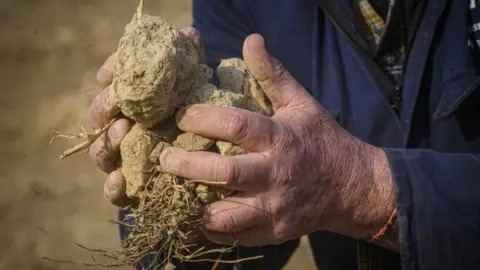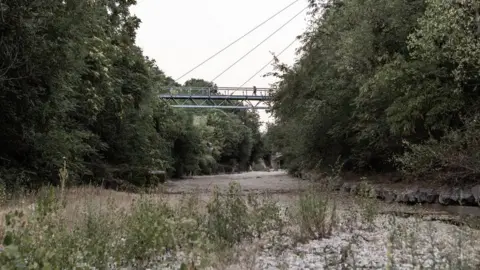Drought emergency declared in northern Italy
 EPA
EPAItaly has declared a state of emergency in five northern regions surrounding the Po River amid the worst drought in 70 years.
The drought threatens more than 30% of Italy's agricultural produce, according to agricultural union Coldiretti.
Emilia-Romagna, Friuli Venezia Giulia, Lombardy, Piedmont and Veneto will be given €36.5m (£31m; $38m) in emergency funds to tackle the water shortage.
Several municipalities have already announced water rationing.
"The state of emergency is aimed at managing the current situation with extraordinary means and powers," the Italian government said. It said it could take further measures if the situation did not improve.
Unusually hot weather and low rainfall across winter and spring have compounded water shortages in northern Italy and heightened fears about the effects of climate change.
Prime Minister Mario Draghi said climate change was "without doubt" linked to Sunday's glacier collapse in the Dolomites, where seven people died and several others are missing.
The Po is Italy's longest river, flowing eastward for more than 650km (404 miles). Farmers in the Po Valley say salty seawater is now seeping into the river, destroying crops.

Landscape transformed as key artery dries up

The Po is the main artery that cuts through Italy's heartland where one-third of its food is produced.
Historically it's the lifeblood of one of the most vibrant and important economic areas in Europe and it has become the symbol of prosperity in northern Italy.
Today the drought has transformed the landscape and significantly affected all activities connected to the river, from the production of tomatoes and watermelons, to farming. Parmesan cheese producers are worried they won't be able to feed their cows.
 Anadolu Agency via Getty Images
Anadolu Agency via Getty ImagesThe drought - caused by higher temperatures than usual and scant snow or rainfall - raises broader questions about the management of water crises that experts say will become more frequent due to climate change.
If it doesn't rain, the situation is expected to worsen. In Milan, all ornamental fountains have been turned off, with the mayor prohibiting the washing of private vehicles and watering gardens. Several other northern Italian cities have already begun rationing drinking water.
In the small town of Castenaso, near Bologna, the mayor has banned hairdressers and barbers from shampooing their customers twice, to save as much water as possible.

Meanwhile, in the far north of Italy the search continued for five Italians missing after the collapse of the Marmolada glacier on the highest peak in the Dolomites. Authorities originally said 13 people were unaccounted for but eight of them were later tracked down.
Drones equipped with thermal imaging cameras flew over the area in search of survivors on Tuesday although rescuers warned there was little hope of finding anyone alive. Seven people are known to have died and another eight were hurt in an avalanche caused by the glacier's collapse.
Among the dead were several foreigners. Officials in Prague said on Tuesday that two Czech citizens had been killed in the avalanche.
The Italian prime minister travelled to the area on Monday and President Sergio Mattarella said the disaster was a symbol of what climate change could do the world if left unchallenged.
Experts say Alpine glaciers have been melting steadily and the Marmolada glacier is part of the trend. A study by the University of Padua last year estimated almost 90% of the Marmolada glacier's volume had been lost in the past century.
